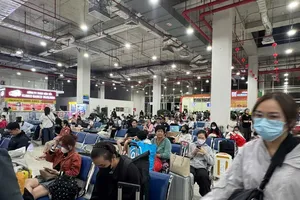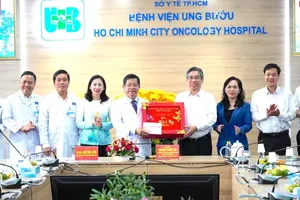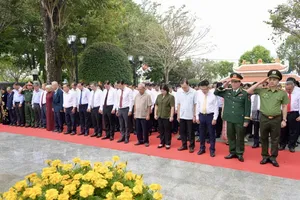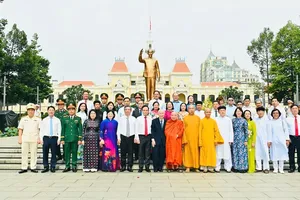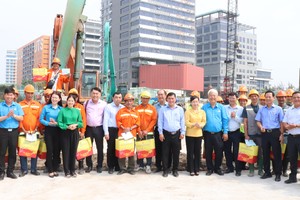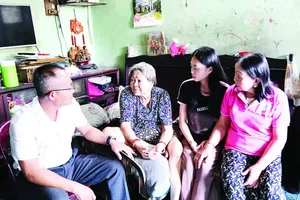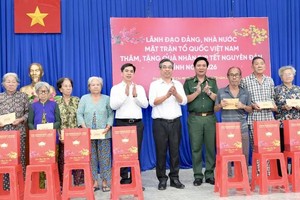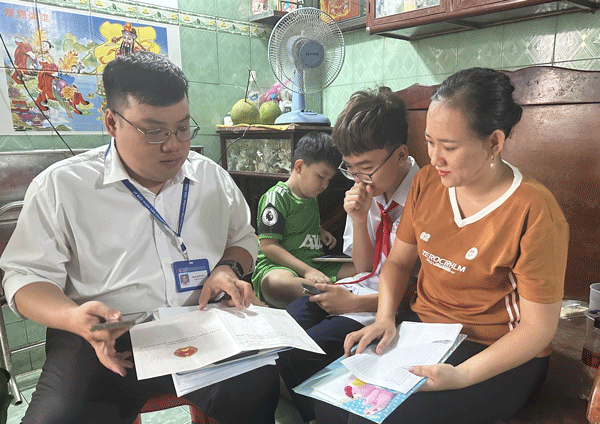
Civil servants update information directly at households
According to records, officials from several wards and communes in Ho Chi Minh City are still focusing on visiting households to update land data in order to reach the “finish line” of the “90 Days to Enrich and Clean Land Data” campaign by the end of November. At noon on November 20, the working group of Dien Hong Ward, including officials from the ward People’s Committee, ward police, and neighborhood leaders, went directly to residents’ homes to carry out the work.
At the home of resident Nguyen Thi Thanh Mai at 606/39 3 Thang 2 Street, the working group collected information from the land-use certificate and citizen ID card of the land user. Afterwards, they prepared a working record noting information about the house and land, as well as ownership details. At the end of the session, Ms. Mai shared: “I have heard information about fraudulent cases of fake land-use certificates used to appropriate assets, so I was very worried that one day I might become a victim. After the police officer explained that this update would help citizens be identified with their assets, I felt very reassured.”
Meanwhile, in Thoi An Ward, ward officials also visited households directly to update land information. A man residing in Thoi An Ward said that his family works during office hours and is only at home in the evening. Understanding the situation, ward officials, ward police, and neighborhood leaders came directly to his home to update the family’s land information. The update was quick, taking only about five minutes to photograph the original land-use certificate and citizen ID card. He said that standardizing the land database with personal information is very necessary in the context of digitalization today. He believes that digital data will be tightly managed, easily searchable, and that citizens will not need to photocopy documents when handling administrative procedures. Most importantly, he said, there will be no fear of impersonation in the process of using and managing assets.
Sharing about the review and update of land data, Vice Chairman Nguyen Dinh Bao Quoc of the Thoi An Ward People’s Committee said that most information on land plots and land users is already available, and the ward only collects data in cases where information is missing. Accordingly, for land plots where the certificate lacks information on the land user or lacks the citizen ID number, ward officials go directly to households to collect it.
From the filtered list, ward police coordinate with neighborhood leaders to visit each household, collect scanned or photographed certificates and citizen ID cards, and transfer them to the Department of Economics, Infrastructure, and Urban Affairs to update the land data into the management software system.
Accelerating to reach the deadline
Regarding the implementation of the “90 Days to Enrich and Clean Land Data” campaign, Deputy Director Nguyen Hong Loc of Land Registration Office Branch No. 15 said that when the police and ward People’s Committees receive lists from the Administrative Management Police Department (PC06) of Ho Chi Minh City Police and the city’s Land Registration Office, the units divide into two groups and immediately begin work. Specifically, list group 1 is led by the ward People’s Committee to collect certificate information; list group 2 is led by ward police to collect citizen ID information.
Accordingly, Branch No. 15 has proactively reviewed and scanned supplementary certificates from archives, then compiled lists of cases after reviewing stored records and processing faulty data that could not be supplemented by scanning. After processing the data, Branch No. 15 transfers the remaining cases to the wards, and ward officials must visit households to collect information.
Thanks to the efforts of each locality, the collection and updating of land data in many wards and communes of Ho Chi Minh City is now in the stage of completion according to plan. According to Dang Cong Tuan, Head of the Department of Economics, Infrastructure, and Urban Affairs of Thong Tay Hoi Ward, as of November 15 the ward had reviewed and collected land data for 2,829 out of 3,210 land plots, reaching a rate of more than 88 percent. He said that during implementation, the ward also encountered difficulties, such as households being uncooperative when officials visited, with some considering the provision of certificates sensitive and reluctant to provide originals. In many cases, information differed from the lists provided by the police, as ownership had changed due to gifting, inheritance, or purchase and transfer.
Meanwhile, Vice Chairwoman of the People’s Committee in Dien Hong Ward, Truong Thi Minh Hanh reported that the ward has reviewed and completed about 5,355 out of 5,372 files accounting for 99.6 percent of the total number of files requiring scanning or photographing to upload to the system, and 7,357 out of 7,682 files (a rate of 95.7 percent) requiring verification of the information for land use and housing ownership.
Vice Chairwoman Truong Thi Minh Hanh emphasized: “Completing the land database not only enhances the effectiveness and efficiency of state management at the local level but also creates a solid foundation for digital transformation, shortens the time for administrative procedures, and prevents errors, disputes, and negative practices in the land sector.”
She added that, in addition, citizens can easily access information on planning, land plots, and land use certificates through the city’s digital platforms such as the Public Service Portal and the Electronic Land Information Portal.
